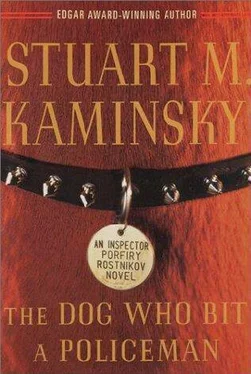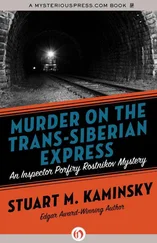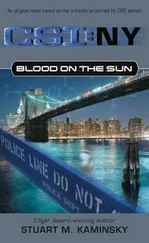Stuart Kaminsky - The Dog Who Bit a Policeman
Здесь есть возможность читать онлайн «Stuart Kaminsky - The Dog Who Bit a Policeman» весь текст электронной книги совершенно бесплатно (целиком полную версию без сокращений). В некоторых случаях можно слушать аудио, скачать через торрент в формате fb2 и присутствует краткое содержание. Жанр: Полицейский детектив, на русском языке. Описание произведения, (предисловие) а так же отзывы посетителей доступны на портале библиотеки ЛибКат.
- Название:The Dog Who Bit a Policeman
- Автор:
- Жанр:
- Год:неизвестен
- ISBN:нет данных
- Рейтинг книги:3 / 5. Голосов: 1
-
Избранное:Добавить в избранное
- Отзывы:
-
Ваша оценка:
- 60
- 1
- 2
- 3
- 4
- 5
The Dog Who Bit a Policeman: краткое содержание, описание и аннотация
Предлагаем к чтению аннотацию, описание, краткое содержание или предисловие (зависит от того, что написал сам автор книги «The Dog Who Bit a Policeman»). Если вы не нашли необходимую информацию о книге — напишите в комментариях, мы постараемся отыскать её.
The Dog Who Bit a Policeman — читать онлайн бесплатно полную книгу (весь текст) целиком
Ниже представлен текст книги, разбитый по страницам. Система сохранения места последней прочитанной страницы, позволяет с удобством читать онлайн бесплатно книгу «The Dog Who Bit a Policeman», без необходимости каждый раз заново искать на чём Вы остановились. Поставьте закладку, и сможете в любой момент перейти на страницу, на которой закончили чтение.
Интервал:
Закладка:
“Valentin Itchak said this would be handled with suitable discretion,” Olga Pleshkov said.
“And it will be,” said Iosef, having not the slightest idea of who Valentin Itchak might be. “We will locate your husband and return him to you.”
“You won’t hurt him?” she asked.
“Hurt father?” Ivan said. “They’ll be lucky to bring him here screaming and luckier still if they don’t lose a tooth or an eye in the process.”
Akardy Zelach, who had lost much of the sight in his left eye two years earlier after being attacked from behind by a thief, winced at the prospect of a further attack.
“We won’t hurt him,” said Iosef. “I must ask one more question.
Yevgeny Pleshkov is an important man. Is it possible that there may be some reason for his disappearance other than his. . problem?”
“Like what?” asked Olga Pleshkov.
“Like he was kidnapped and possibly murdered by political enemies,” said Ivan.
His mother turned to the young man with horror in her eyes.
“No!”
“Why not?” asked Ivan with a shrug. “These are dangerous times and my father is a loud, popular man, hated and feared by many. But if you ask me, he is simply drunk somewhere.”
Though he did not particularly care for the young man in the cut-off sweatshirt, Iosef ’s inclination was to agree. Gorbachev had, before his fall, cracked down on alcoholism with little success. Now it was back and more open than ever. Russians had drunk before because it was part of their heritage, and to escape the burdens of Communist rule. Now they drank to escape the chaos of unregulated freedom. It was estimated, Iosef knew, that two hundred fifty thousand Russians were dying each year from alcohol-related causes. Yeltsin drank. Pleshkov drank and might well be dead this time or the next.
Olga Pleshkov rose, erect, handsome, clasping her hands to indicate that the policemen were excused and she would not be shaking their hands. “Please excuse me. If you have any more questions, you can ask my son. He seems to have all the answers.”
She left the room quickly and her son said, “You will have to forgive my mother. She didn’t even offer you tea or coffee. But I will do so.”
“Nyet, spahssebah,” said Iosef.
Zelach would have liked some tea and perhaps a biscuit, but he also said, “No, thank you.”
“You have more you can tell us about where we might find your father? His friends? People he drinks with, anything that might help?”
Ivan Pleshkov did not hesitate.
“There is a woman he goes to when he decides to lose a few days, a week or two. Her name is Yulia. I think her last name is Yalutshkin or Valushkin, something like that. He spends the days sleeping it off in her apartment. Also, there is an old childhood friend, Oleg Kisolev. He’s a coach of the Dynamo soccer team, used to be a player. I remember watching him. Even as a child I could tell when he visited my father that Kisolev was a pandering fool, with a good but not great kick.”
Zelach was writing carefully.
“Any address for Kisolev?” asked Iosef.
“I don’t have one. You can look in my father’s desk in there.”
“Thank you,” said Iosef. “You’ve been very helpful. Are you interested in politics too?”
“You mean,” said Ivan, “do I have a job? The answer is yes. I am a computer-program designer for the power company. I make more money than my father. I have my own apartment in Moscow.
I like girls. I do not drink and I have no political ambition. Any other questions?”
“Not now,” said Iosef, rising.
Zelach put away his notebook.
“My mother will want me to watch you go through my father’s things. We have been through this before, as you might have guessed. My mother is afraid that the police might steal something of value. I have no desire to offend you, but I hope you understand.”
“You don’t know us,” said Iosef. “No offense has been taken.”
The search of Yevgeny Pleshkov’s office yielded little of any possible use-not even a hidden bottle of vodka, not a personal telephone book, no letters. The office hardly seemed used. The search was quick, made quicker by the hovering of Ivan Pleshkov.
“You are a basketball fan?” asked Iosef, giving up on his search and looking at the young man’s shirt with a cartoonlike design of the head of an angry bull.
“Yes,” said Ivan. “It is my goal to move to Chicago and buy sea-son tickets to all the Bulls games. It is my hope that I can do this before Michael Jordan retires. Getting work as a computer-program designer will be no problem.”
“Might it not affect your father’s political ambitions were his son to move to the United States?” asked Iosef.
“I’m sure it would,” said Ivan. “I do not hate my father, but he has taught me to care little about what happens to him. I hope you find him alive, but if you don’t, my mother will cope and I will move to America that much sooner.”
Ivan walked out the door to the office, with Zelach and Iosef behind.
“Thank you for your help,” Iosef said. “We will contact your mother as soon as we find him.”
When the two detectives were outside in the morning sun, Iosef took a deep breath.
“Well, Akardy?”
“I don’t like him,” said Zelach, who did not look forward to the half-mile walk and the train ride back to Moscow.
“The father or the son?” asked Iosef.
“Neither,” said Zelach.
“Understandable,” said Iosef, starting to walk down the road.
“I think it might be reasonable to add the mother to a list of the unlikable.”
“Ah, look, they have a car,” said Zelach. “He could have offered us a ride.”
“That would have been polite,” said Iosef with a smile. “But it is a nice day and this promises to be a relatively easy assignment.”
“Perhaps,” said Zelach, slouching along at the younger man’s side, “but this morning my mother got out of bed and accidentally touched her left foot to the floor instead of her right. She says I will have bad luck and should be careful.”
“You believe that?”
“Of course not,” said Zelach without conviction. “We shall find Deputy Pleshkov.”
“With luck we will find him during the day,” said Iosef. “If not, prepare yourself for little sleep tonight.”
When they were a few hundred yards down the road and had passed both newly constructed large dachas and crumbling little cottages, a Mercedes-Benz pulled up next to them and Ivan Pleshkov, who had changed into a plain white shirt with short sleeves, said through the open window, “You don’t have a car?”
“No,” said Iosef.
“I’ll give you a ride to Moscow,” he said. “I’m going there anyway. Get in.”
“Maybe your mother was wrong about which foot she touched to the floor first,” said Iosef, opening the back door.
Zelach didn’t think so.
Chapter Three
Rostnikov had returned to Petrovka and immediately reported to Yaklovev.
Pankov, the sweating dwarfish secretary who had survived Colonel Snitkonoy’s promotion and now served as secretary to the Yak, had ushered Rostnikov into the director’s office, as was his standing order. The only requirement was that the director was alone and that Pankov announced that Rostnikov was there to see him.
Pankov lived in constant fear of his superior. The slightest sign of disapproval or possible problems sent the clean-shaven little man of indeterminate age into a sweat, regardless of the heat or lack of it in Petrovka.
The meeting had been relatively brief, with Rostnikov standing in front of the desk of the Yak, who listened carefully to the early report on the new cases.
“Another report by the end of the day, or earlier if there are changes,” said the Yak, sitting erect. “I want the names of those involved in the dogfights, and I want Congress Member Pleshkov found as soon as possible-and I would like it done quietly.”
Читать дальшеИнтервал:
Закладка:
Похожие книги на «The Dog Who Bit a Policeman»
Представляем Вашему вниманию похожие книги на «The Dog Who Bit a Policeman» списком для выбора. Мы отобрали схожую по названию и смыслу литературу в надежде предоставить читателям больше вариантов отыскать новые, интересные, ещё непрочитанные произведения.
Обсуждение, отзывы о книге «The Dog Who Bit a Policeman» и просто собственные мнения читателей. Оставьте ваши комментарии, напишите, что Вы думаете о произведении, его смысле или главных героях. Укажите что конкретно понравилось, а что нет, и почему Вы так считаете.












